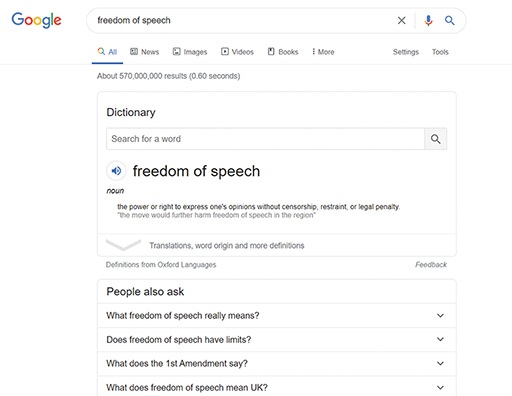4 Are search engines bad for your health?
Timing
This section of the course should take you around two hours to complete. If you don’t have time to work through it all at once, there are break points where you can stop and return later.
In countries without systemic surveillance, the internet appears to offer perfect freedom of expression. While previous generations of authors relied on finding editors and publishers willing to take the risk of distributing their material, today anyone connected to the internet can create new content, comment on existing material and share a wide range of media on any number of free services. Their contributions are then made accessible through search engines and by further sharing and commenting. The result has been an explosion of content.
When I was writing the paragraph above, I idly entered Freedom of speech into Google; it told me there were nearly 250 million relevant results (see Figure 11 below)! It will have undoubtedly changed by the time you read this.

However, I have many questions about these results, including the following.
- Are there really 250 million different places where I can learn about freedom of information?
- Who created all of these documents? There can’t be more than 250 million experts in the field of freedom of information.
- Do these links point to high-quality, factual resources, to incorrect information, or to advertising? In fact, the first result below the definition of freedom of speech is a link to a company selling speech recognition software. Very useful, but nothing to do with the concept of freedom of speech.
- If the material is of varying quality, were the best resources prioritised so they appear near the top of the results, rather than buried among millions of others?
- Or have some resources been given greater visibility because their creators have paid to be promoted to the front page of the search results?
- And were any results suppressed because they were considered unacceptable?
There is little chance that I could ever answer these questions in a satisfactory manner for this single search query, let alone the countless requests for information made to search engines every day.
Fortunately, researchers have been examining how people use information from search engines. You will now look at an example regarding children’s health.
